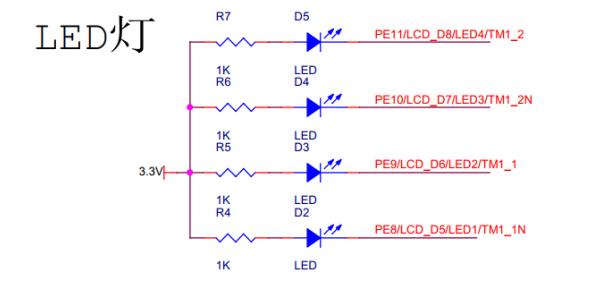嵌入式系统stm32 跑马灯实验
Posted Ice丨shine
tags:
篇首语:本文由小常识网(cha138.com)小编为大家整理,主要介绍了嵌入式系统stm32 跑马灯实验相关的知识,希望对你有一定的参考价值。
一、实验目的和实验要求
实验要求:短按实验板扩展板上的按键SW18,依次点亮核心板上D2-D4指示灯。长按按键2秒,实现四个灯循环点亮(跑马灯)。
二、实验原理

如上图所示,四个 LED 正极通过电阻连接到电源+3.3V,LED 负端连接到 CPU 的 PEx
引脚。由此可知,只需要通过 CPU 控制 PEx 引脚为低电平,对应的指示灯即可点亮,如果
控制 PEx 引脚为高电平,这对应的 LED 熄灭。通过程序循环扫描,即可实现跑马灯控制。
三、实验结果
#include "stm32f10x.h"
#define RCC_APB2ENR (*((volatile unsigned int*)0x40021018))
#define GPIOE_CRH (*((volatile unsigned int*)0x40011804))
#define GPIOE_BSRR (*((volatile unsigned int*)0x40011810))
#define GPIOE_IDR (*((volatile unsigned int*)0x40011808)) // ¶Ë¿ÚÊäÈëÊý¾Ý¼Ä´æÆ÷
#define GPIOE_ODR (*((volatile unsigned int*)0x4001180C))
#define GPIOB_CRL (*((volatile unsigned int*)0x40010C00))
#define GPIOB_IDR (*((volatile unsigned int*)0x40010C08))
void LED_Init(void)
RCC_APB2ENR |= 1<<6;
GPIOE_CRH &=0XFFFF0000;
GPIOE_CRH |=0x3333;
GPIOE_BSRR |= 1<<8;
GPIOE_BSRR |= 1<<9;
GPIOE_BSRR |= 1<<10;
GPIOE_BSRR |= 1<<11;
void Delay(unsigned int nCount)
while(nCount > 0)
nCount --;
int count=0;
void LED_Turn(void)
//通过count判断现在四个灯的状态,并完成切换
if(count==1)
GPIOE_BSRR |= 1<<8;
GPIOE_BSRR |= 1<<25;
count++;
Delay(0xfffff);
Delay(0xfffff);
else if(count==2)
GPIOE_BSRR |= 1<<9;
GPIOE_BSRR |= 1<<26;
count++;
Delay(0xfffff);
Delay(0xfffff);
else if(count==3)
GPIOE_BSRR |= 1<<10;
GPIOE_BSRR |= 1<<27;
count++;
Delay(0xfffff);
Delay(0xfffff);
else if(count==4)
GPIOE_BSRR |= 1<<11;
GPIOE_BSRR |= 1<<24;
count=1;
Delay(0xfffff);
Delay(0xfffff);
else
GPIOE_BSRR |= 1<<24;
count++;
Delay(0xfffff);
Delay(0xfffff);
//跑马灯控制函数,让4个灯轮流亮,最后全部重置熄灭
void LED_Turn_Run(void)
while(1)
GPIOE_BSRR &= ~(1<<8);
GPIOE_BSRR |= 1<<24;
Delay(0xfffff);
Delay(0xfffff);
GPIOE_BSRR |= 1<<25;
Delay(0xfffff);
Delay(0xfffff);
GPIOE_BSRR |= 1<<26;
Delay(0xfffff);
Delay(0xfffff);
GPIOE_BSRR |= 1<<27;
Delay(0xfffff);
Delay(0xfffff);
GPIOE_BSRR |= 1<<8;
GPIOE_BSRR |= 1<<9;
GPIOE_BSRR |= 1<<10;
GPIOE_BSRR |= 1<<11;
Delay(0xfffff);
Delay(0xfffff);
void KEY_Init(void)
RCC_APB2ENR |=1<<3;
GPIOB_CRL |=0X04000000;
//static u8 fac_us=0;
void delay_us(u32 nus)
int i,cnt ;
cnt = nus<<1 ;
for ( i = 0 ; i < cnt ; i++ );
void delay_ms(u16 nms)
int i ;
for( i = 0 ; i < nms; i ++ )
delay_us(1000) ;
u8 KEY_Scan(void)
//键盘扫描,单按返回1,长按返回2
u8 key_1= 0;
int flag=0;//通过flag记录按键时间长短
if(GPIOB_IDR & 0x40)
key_1=1;
else
key_1=0;
if(key_1==0)
delay_ms(100);
if(key_1!=0) return 0;
while(key_1==0)
flag++;
Delay(0xfffff);
if(flag >= 15) return 2;//flag达到15则判定为长按
if(GPIOB_IDR & 0x40)
key_1=1;
else
key_1=0;
if(key_1==0)
delay_ms(100);
if(key_1!=0) break;
if(flag>0) return 1;//flag大于0但是没达到15判定为短按
return 0;
int main(void)
u8 t=0;
BoardInit();
LED_Init();
KEY_Init();
while(1)
t=KEY_Scan();
if(t==1)//在main函数中进行判断按键状态
LED_Turn();
else if(t==2)
LED_Turn_Run();
return 1;
以上是关于嵌入式系统stm32 跑马灯实验的主要内容,如果未能解决你的问题,请参考以下文章